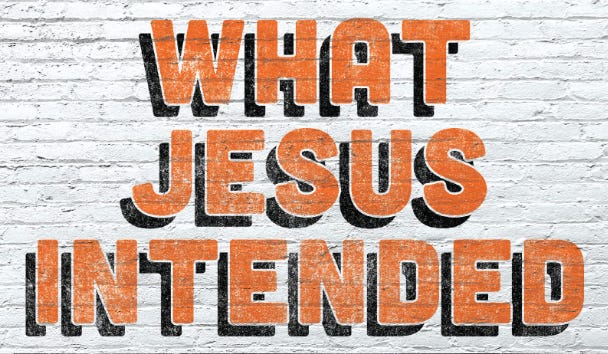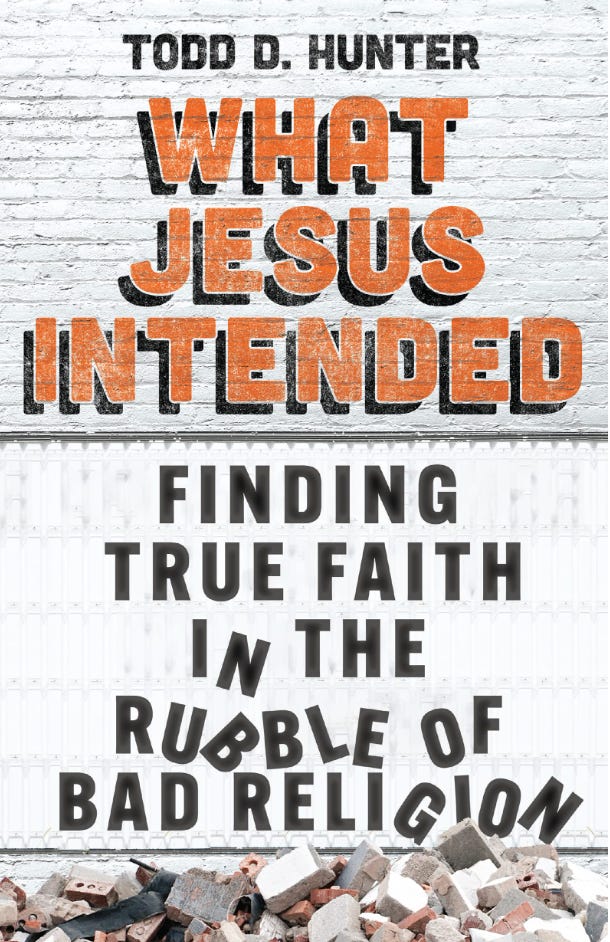Bad Religion
Esau McCaulley observed something about this generation of Christians: “we are often presented with two alternatives, neither of which is very appealing: deny the failings we observe within the church or contend that Christianity is not up to the challenges posed by our age.” He writes this in the Foreword to our Bishop Todd Hunter’s new book, What Jesus Intended.
The thesis: “For Bishop hunter, we do not need to remake Christianity for the modern person; the modern person needs to rediscover Jesus as the solution to the problems and traumas that plague humanity in every age.” I’m not so sure the modern situation is not more unlike than like problems of other ages. Still, Jesus as a solution aims in the right direction.
The problems are legion, but Todd Hunter’s diagnosis gets to some of them with this: “the troublesome headlines of fallen leaders and bad religion, along with personal negative experiences in church, leave many so tossed about that they become de-churched. Victims of leadership malpractice and spiritual abuse in the church feel battered and carried away by contextual forces over which they have no say.”
What some of us have observed is that the instinct of the de-churched or the doubting is not to go to the pastor but to a friend, to someone they know they can trust:
And, “In those moments we frantically searched the surface of the water right and left for a spiritual friend bobbing along near us, for anyone or anything that could provide assurance that my bad religious experience could be survived.”
Bishop Todd recalls a period when he and his wife were themselves de-churched and found consolation only in a small house church dealing with spiritual formation.
He wants many today to know they are not alone. You won’t find Bishop Todd pandering to the hardheads who think of deconstruction as little more than today’s sexy.
The problem is bigger than big.
I see a similar, widespread reality in countless others via conversations I have had with religious leaders of all denominations who are profoundly discouraged with various aspects of the church. These people cover the organizational chart of church leadership: home group leaders, Sunday school and youth workers, pastors, administrators, women's and men's programs leaders, members of vestries and boards, parish council members, professions and deans, and denominational leaders of every level. No category or type is immune.”
Bad religion has disastrous impacts on a person’s life. Here’s wisdom: “church hurts from bad religion are accompanied by a profound sense of loss. They hurt more than most of life's other hurts. They sometimes feel on par with divorce or even death.”
Agree?
Many today are wondering how to recover those who have experienced bad religion. It begins right here, with empathy: “I have real empathy for those who are deconstructing elements of their faith. such areas of spiritual life can, once on the other side of them, lead to constructive growth. the progress of a pilgrim is always the goal of my spiritual life.”
I don’t believe enough have formed empathy for these persons.
There is no quick fix. But there is Someone. “I have pursued this progress by staying on the path marked by the person and work of Jesus. I have survived by constantly making my way back to Jesus, do the nature of his being, his words, and his works.”




"I have survived by constantly making my way back to Jesus, do the nature of his being, his words, and his works." Amen. This is a book for our time. It communicates the heart of so many of us who believe in and follow Jesus and see "the rubble".